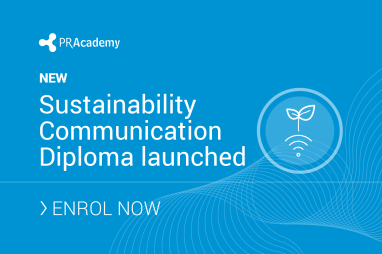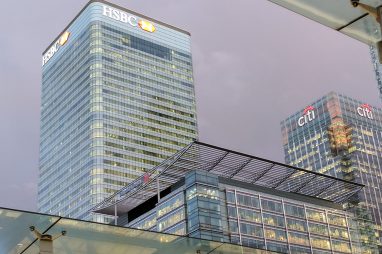ESG: Environmental, Social and Greenwashing?
About the author
Philippa Anderson prepared this article as part of a CIPR Professional PR Diploma assignment while studying with PR Academy.

The ESG movement has grown in interest and power but alongside it, so has greenwashing. What does this mean for communications professionals?

Today Environmental, Social and Governance (ESG) has become a fundamental part of corporate strategy with the purpose to shift companies’ views and efforts in how they create long-term value for their customers, employees and society.
The climate crisis and COVID-19 pandemic have highlighted the need for companies to strengthen their resilience towards unprecedented environmental or societal events and consequently, accelerating the ESG agenda.
ESG, a term that originated from the investment sector, has evolved from an investor’s assessment tool to evaluate risk and growth opportunities and has now gone mainstream gaining interest from the public. As a result, companies are increasingly facing reputational challenges and has prompted them to communicate their sustainability credentials wider.
According to Deloitte’s 2022 Sustainability & Consumer Behaviour research, consumers have become more environmentally and socially conscious and are ‘choosing brands based on their sustainability and ethical practices.’ In addition to this growing trend, First Insight’s recent research revealed two-thirds of consumers are willing to pay a premium for a sustainable alternative. This a tempting motive for companies to communicate their sustainability credentials beyond investors.
According to PR consultancy firm Ambitious, PR and communications firms are now frequently being asked to support companies with their ESG communications which is good news for the profession as it demonstrates the need and value of their crucial skillset. Sounds like a win-win initiative.
Despite more companies adopting ESG practices, alongside this movement there is a growing side effect where some companies are communicating false or misleading claims about their ESG credentials to attract and appease stakeholders. This practice is known as greenwashing.
Greenwashing has become so prevalent that Merriam-Webster declared it an official part of the English language with a spot in the dictionary stating ‘when many people use a word in the same way, over a long enough period of time, that word becomes eligible for inclusion’.
Greenwashing is not a trivial offense. It brings long-lasting, detrimental consequences to consumers, the company and the environment as summaries by legal firm Tenet: ‘greenwashing can imperil customer trust, damage brand reputation, and detract attention from true environmental clean-up efforts’.
Even the perception of ‘greenwashing can deeply fracture the relationship with all your stakeholders and irreparably damage the trust your consumers / employees have’ according to Betsy Atkins, CEO of investment company Baja LLC. Companies across multiple industries including fashion, cosmetics, automotive, sports and fast food are increasingly being called out by governments, industry bodies, activist groups and the public for greenwashing. In 2021, the International Consumer Protection Enforcement Network found that on 500 websites, up to 40% of environmentally friendly claims could be misleading customers.
Seeing the damaging repercussions and public backlash of greenwashing, some spectating companies are reacting by doing the opposite, and are hesitant to communicate any ESG related content at all, even if they are making a positive impact. Recently, Innocent Drinks CMO Kirsty Hunter said her ‘biggest fear is that brands and businesses will feel as though they can’t do anything because they’re too nervous,’ she explained. ‘This is one of the biggest challenges… and brands have a massive role to play in solving it.’
Greenwashing not only impacts the reputation of companies and brands but it also threatens the integrity of those responsible for reputation management and public relations.
Greenwashing brings a harmful association to the public relations (PR) and communications industry and increases the risk of the profession being labelled as deceptive and untrustworthy.
The profession’s reputation is already vulnerable where trust is a huge concern of the public in the age of mistrusted media. PRWeek’s News Editor James Halliwell confirmed this damaging association is starting to stick as ‘PR & Communications agencies are increasingly accused of enabling or even generating greenwashing content’.
From a concept with the purpose to drive positive change, what has gone wrong to enable greenwashing? It could be because there are over 600 ESG reporting standards globally. According to the World Economic Forum, ‘some companies use their own custom frameworks and select their own parameters and standards created by the industries themselves without any regulatory oversight. Furthermore, companies are compared against their peers in their own industry, which explains why some oil giants are included, but companies such as Tesla are excluded from the list. Different standards create inefficiencies and undermine their integrity and utility.’
Responding to these concerns, five ESG framework and standard setting institutions (CDP, the Climate Disclosure Standards Board, the Global Reporting Initiative, the International Integrated Reporting Council and the Sustainability Accounting Standards Board) are now working together to develop a unified criteria and reporting framework for investors, but this will take time. This ambiguity has rolled into the PR and communications industry where ESG consumer communications lacks rigour and clarity. Mark Weiner, Chief Insights Officer at PublicRelay explains: ‘One ESG trap is the vagueness around how it’s defined. There are no universal guidelines for what ESG means nor how it is measured and reported. Companies have a lot of leeway for selective reporting and are vulnerable to accusations of spin.’ This has led to the adoption and increasing use of empty buzzwords within ESG communications that have no clear definition or recognised standard such as ‘ecological’, ‘environmentally-friendly’, ‘natural’, ‘green’, even ‘sustainable’.
Worrying revelations from Clearly’s, PRCA Agency of the Year (2021), recent poll found one in five UK business leaders and communications professionals admit to greenwashing, 50% of the UK business surveyed said they are failing to deliver on their sustainability commitments and 20% do not know if their business has metrics in place to measure the effectiveness of their environmental initiative. However, what is not understood is the scale of unintentional greenwashing by communications professionals. According to Katy Barney, ESG & Sustainability PR consultant suggests ‘the complexity and nuance of these myriad issues can lead to missteps or accidental greenwashing, or inaction for fear of error. But doing nothing is not a viable option.’ So how can communications professionals navigate this complex topic, be aware of greenwashing and avoid it?
Most communications professionals will not be ESG experts nonetheless, ignorance is not accepted as an excuse for greenwashing, particularly by the public. With any topic or industry, they will need to be agile and take time to learn the ever-changing ESG criteria, challenges and opportunities and use their exact expertise to inspire positive change. As Jessi Baker, CEO of sustainability communications software company Provenance.org, explains ‘as expert cognitive influencers, they have a unique and crucial part to play in driving behaviour change as well as shaping and implementing effective corporate sustainability strategies.’
ESG is part of today’s narrative and it will evolve with tighter policies coming into play along with societal changes. There will be hurdles ahead but this is where communications professionals can play a critical role to support their company or client speak transparently of these challenges head on rather than avoiding. Elizabeth Maclean and Mike Evans, Co-Managing Directors at Herdwick Communications explains that the role of communications practitioners is ‘to help define sustainability messaging for our organisations that map the progress towards achieving zero emissions. In so doing, there is a significant danger that we can overestimate the effects of the positive measures without fully understanding the business’ total impact on the environment.’
There is no quick fix or one solution to sustainability. It is about constructive progress, a transition and taking a long-term, strategic approach which should be reflected in ESG communications planning and content.
Despite some level of ESG awareness in our society, it is still in its infancy where stakeholders want to understand the value and impact of ESG efforts and this is where communications professionals can help create awareness and manage expectations between company and their stakeholders.
Corporate purpose and ESG credentials should be fused together as both drive future value for the business, our environment and society. In a letter to fellow CEOs from Chairman and Chief Executive Officer of BlackRock, one of the world’s leading providers of investment, advisory and risk management solutions, Larry Fink proclaimed that companies cannot exist without society and purpose is what will help companies realise their role in society.
Responsible for stakeholder engagement and reputation management, communications professionals will need to ensure corporate purpose and ESG initiatives are clear and aligned to avoid integrity gaps between a company’s purpose and operations versus their environmental claims. This disconnect leads to greenwashing practice and allegations, which is particularly evident within the Oil and Gas industry.
Even with a clear purpose, the sustainability narrative and claims will not hold unless they are real and backed by appropriate evidence. ESG communications must contain supportive and relevant hard goals, metrics, and case studies. However, even with what appears to be evidenced-based communications, there seems to be discrepancies. Ironically, but understandably with 600 ESG reporting standards, companies in the cleaning industry have been accused of greenwashing.
Unilever-owned washing brand Persil developed 50% post-consumer recycled plastic bottles and a product that is effective at a lower washing temperature and therefore uses 38% less energy. However Advertising Standards Authority (ASA) banned its latest advert on the grounds of communicating misleading claims about its environmental credentials and a lack of evidence that prove the full life cycle of the liquid was more sustainable than its previous product. Despite ASA’s ruling of breaching the Broadcast CAP code, TV’s ad-clearance body Clearcast disagreed with ASA and approved the advert stating the environmental claim was ‘fully justified’: ‘Clearcast believed the product benefits were set clearly within the context of Persil’s own development in the ad’. It is no wonder navigating this topic is a minefield for communications professionals.
Recognising the gap in ESG communication guidelines, last year global guidance was issued to address greenwashing. The Green Claims Code from Competition & Markets Authority provides guidance on checking environmental claims are genuine as well as the World Federation of Advertisers who issued Global Guidance on Environmental Claims. Although a landmark effort, the need for stronger and continued guidance on ESG communications is required by leading institutes in the PR and communications industry. However, it may also want to take on board lessons learnt from the investors sector, by aligning clear guidance quickly between communication institutes and authorities before guidelines multiply and become complex.
Communications professionals will need to get comfortable in challenging their company or clients sustainability claims to avoid greenwashing and it is encouraging to see this is happening already.
PRCA’s research this year found that 45% of UK PR professionals surveyed observed their organisation attempt to greenwash, however 89% pushed back on this and 57% managed to change the approach as a result. This research has uncovered and confirmed the scale of the industry’s ethical role and responsibility to mitigate greenwashing. PRCA’s Climate Misinformation Strategy Group representative Laura Sutherland said: ‘We have a responsibility to ensure any unethical communication or attempts are challenged. The call to action to industry is this: be more brave – learn about ESG, learn how to approach a difficult situation with your boss or your client, start setting your own agency targets and communicate the action you’re taking.’ If a company cares about its bottom line and with investors incorporating ESG and company reputation into their financial decision-making, then the role and authority of communications professionals should be recognised.
With such a young and evolving movement, communications professionals will need to be agile in their approach to ESG learning and communications strategies to avoid greenwashing. They hold the required skillset and resources to build authentic ESG communications, engage with stakeholders and manage their expectations to safeguard the reputation of the profession and of their clients or company. How communications professionals choose to act now to control ESG customer communications to drive out greenwashing practice will shape the future and credibility of the PR and communications industry and ESG movement.


